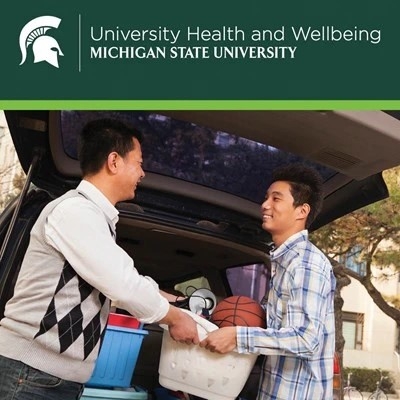
Written by MSU UHW Staff
Nov. 12, 2024
Working in higher education has given access specialists Kelsey Foote and Lindsay Hill insight into challenges that new students face: adapting to new environments, meeting new people, handling increased academic responsibilities, and living away from home, often for the first time. While these issues can be difficult for all students, they can be even more complex for neurodivergent individuals, including autistic students, who often face additional barriers.
In order to meet the needs of autistic students, University Health and Wellbeing (UHW) Resource Center for Persons with Disabilities (RCPD) offers the Building Opportunities for Networking and Discovery (BOND) program. Foote and Hill report that a little support and a sense of community can significantly enhance the success of neurodivergent students and facilitate their inclusion in campus life. Inclusion is a key value at UHW, and on MSU’s campus.
The BOND program focuses on social experiences, skill-building, and peer mentoring. This is especially true of the BOND First-Year / Transfer Transitions Program. Each year, a small cohort of autistic students arrive on campus a few days before general move-in to engage in this program. By allowing students to move in before the general influx, the program reduces environmental stimulation, which can be overwhelming for those with sensory sensitivities or anxiety. Alongside the early move-in, participants benefit from a carefully planned schedule of activities, programming, and a welcoming event designed to ease their transition.
A dedicated section of UGS110, a one credit course on “how to do college,” is also offered each fall for students with autism. While all sections of UGS110 offer college success skills, the section available to BOND students features extra supports, including one-on-one coaching sessions. With weekly interaction in class, staff can proactively address student concerns as they arise.
“Seeing the community built around these programs has been incredibly rewarding,” said Kelsey Foote, an access specialist with RCPD. “People come to MSU for this program,” said Lindsay Hill, an access specialist with RCPD and coordinator of the BOND program. “Outside of the standard credit hour cost for UGS110, we are pleased to offer BOND programming to students with no additional costs. We don’t want it to be a ‘disability tax,’” Hill added.
BOND was created in 2010, and it has expanded in offerings and participation every year. Additional BOND supports are available to students of all class standings, and the BOND Program is just one way that RCPD promotes the inclusion of neurodivergent people at Michigan State University. If you or a potential student are interested in learning about this program, you can visit RCPD’s website or contact RCPD staff at (517) 884-RCPD (4-7273).
Click here to view the article on UHW website.